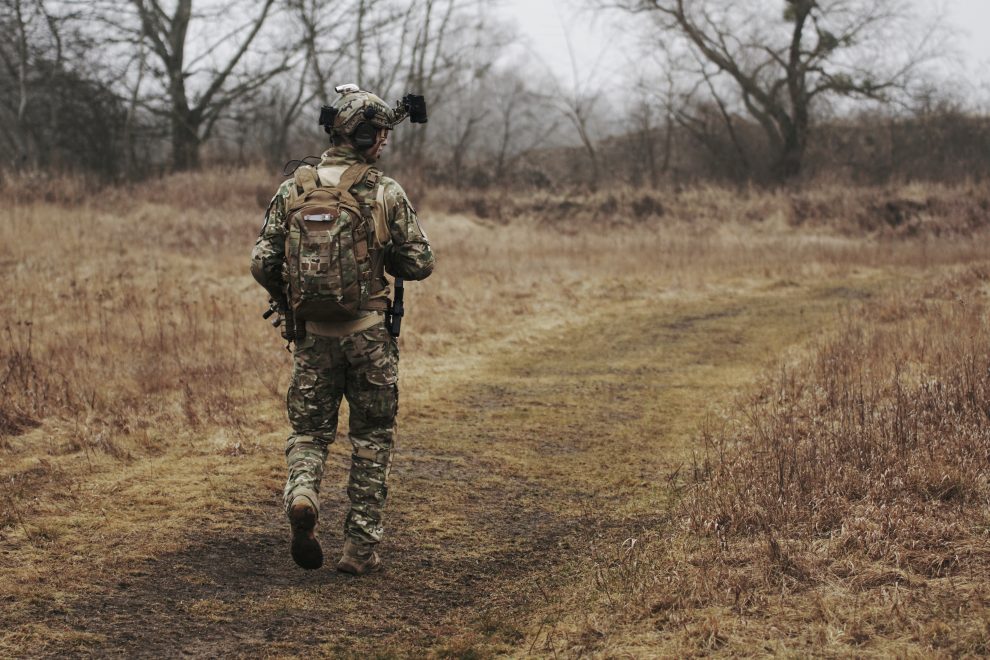The human cost of the war on terror burdens those who fight it.
Americans have grown accustomed to the long list of injuries suffered by the veterans of the wars in Iraq and Afghanistan: brain trauma, shrapnel wounds, lost limbs. Along with these has come a host of psychological and emotional damage: post-traumatic stress disorder, substance dependency and abuse, and depression, all leading to a ballooning rate of suicide among members of the armed forces.
Those who work with veterans, however, are finding that their diagnostic manuals aren’t covering another equally debilitating pain, this time spiritual. Clinicians have dubbed it “moral injury” caused by “perpetrating, failing to prevent, bearing witness to, or learning about acts that transgress deeply held moral beliefs.” To use old-school church jargon, soldiers are suffering from sometimes fatal guilt and shame for what they have done or failed to do on the battlefield or on base.
The spiritual damage to these soldiers shouldn’t surprise us. In the decade of our war on terror, they have been asked to break into people’s homes in the middle of the night, separate families, and shoot without asking questions. They have seen their comrades blown literally to bits and have picked up what is left of Iraqi and Afghan civilians who had the misfortune to encounter a terrorist’s bomb or the spray of bullets from an automatic weapon. A few have witnessed or perpetrated acts of torture—sometimes when ordered to do so, sometimes not—or seen fellow soldiers succumb to fits of rage, rape, and murder.
Considering the sheer inhumanity of what those in uniform have witnessed, it is a wonder that many of these people are still standing. “Moral injury” hardly captures what they have suffered.
What is perhaps most shocking, however, is that by and large the vast majority of Americans remain unmarred by any guilt at all for the profound injustices that have been committed in our name and directly paid for with our common tax dollars.
Even now, more than a decade after 9/11, more than 4 million Iraqis remain refugees. Prisoners remain at Guantanamo Bay, Cuba, stripped of civil and human rights, some having suffered what can only be described as torture. Assassinations via drone aircraft continue unabated in the hinterlands of Yemen and Pakistan; only occasionally mentioned are the “collateral” innocents incinerated by the remote-controlled Hellfire missiles.
To this list of casualties, then, we have no choice but to add our own consciences, willfully blind to the cruelty we have visited upon not only the people of Iraq and Afghanistan but on the men and women in uniform we have sent against them. Throughout this decade of conflict these soldiers—along with their families—have alone borne the cost of our quest for national security. Now they alone are bearing the guilt of our national moral injury, which we will continue to suffer as long as we permit our consciences the inexcusable ignorance of what we have done and continue to do.
It is never too late to repent and make amends for our failure to heed the gospel of peace in the first moments after 9/11. But to begin we must first confess. It is long past time that we began, to borrow one of the 12 Steps of Alcoholics Anonymous, a “searching and fearless inventory” of our consciences to recognize the evil we have done and to take steps to seek forgiveness, repair the damage, and pursue more humane and peaceful ways to defend ourselves and others against the threat of terrorism.
Our first apology will likely be to our fellow citizens who have suffered the brunt of this war, and efforts are already underway to help veterans recover from spiritual injuries. But reconciling with the victims of war nearest to us is only the beginning. Simply put, if we do not seek ways to mend the damage done by our war-making abroad—in the mountains of Pakistan and Afghanistan and the cities of Iraq—we will have no excuse for wondering “why they hate us” when the violence we have done comes home once again to roost.
This article appeared in the September 2012 issue of U.S. Catholic (Vol. 77, No. 8, page 8).
Image: Specna Arms via Pexels













Add comment